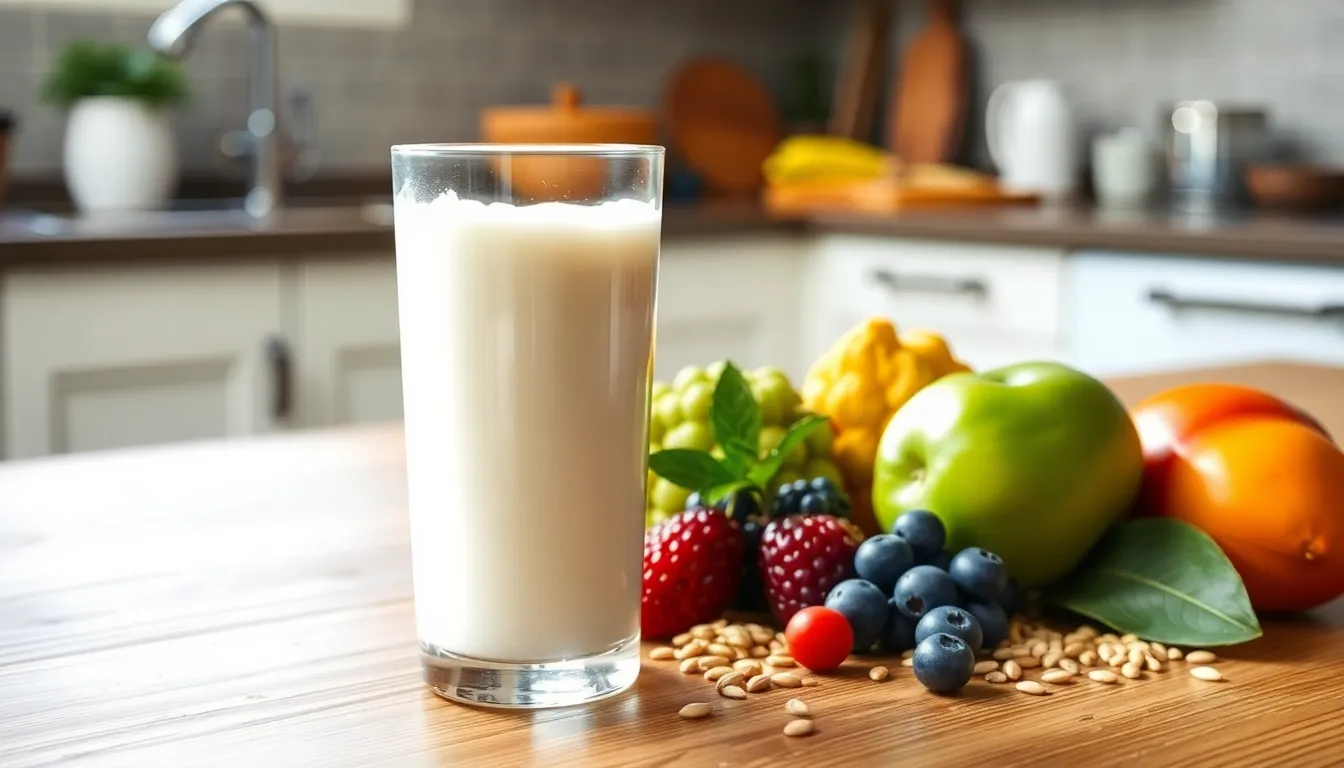Table of Contents
TogglePicture this: you’re enjoying a delicious meal, and suddenly, that all-too-familiar burning sensation creeps up your chest. Acid reflux can turn even the tastiest dishes into a nightmare. But what if there’s a creamy hero waiting in the fridge? Enter kefir, the tangy fermented drink that’s been winning hearts (and stomachs) around the globe.
Packed with probiotics and nutrients, kefir might just be the soothing solution for those pesky acid reflux symptoms. It’s like a friendly bouncer for your gut, helping to keep the bad guys at bay. But is it really the miracle worker it claims to be? Let’s dive into the science and find out if this delightful drink can help turn down the heat on your digestive woes.
Overview of Acid Reflux
Acid reflux, often referred to as gastroesophageal reflux disease (GERD), occurs when stomach acid frequently flows back into the esophagus. This backflow can lead to symptoms like heartburn, regurgitation, and discomfort after meals. Many people experience these symptoms occasionally, while others face chronic issues that affect daily life.
Inflammation in the esophagus can result from this reflux, causing pain and irritation. Factors contributing to acid reflux include obesity, diet, and certain lifestyle choices. Foods such as spicy dishes, chocolate, and citrus can trigger symptoms, making it important for individuals to identify their personal triggers.
Behavioral elements also play a role. Eating large meals or lying down immediately after eating can exacerbate reflux symptoms. Monitoring food intake and timing of meals contributes to symptom management.
Over-the-counter medications may provide some relief, but not everyone responds similarly. A comprehensive approach often yields better results, combining dietary adjustments with potential natural remedies. Research indicates that probiotics in foods like kefir may aid digestion and improve gut health, making it a topic of interest for those seeking alternatives to traditional treatments.
Understanding acid reflux and its triggers sets the stage for exploring how dietary choices, including the incorporation of kefir, can impact symptoms. Prioritizing lifestyle modifications and carefully selecting food can lead to improved quality of life for those affected.
What Is Kefir?

Kefir is a tangy fermented beverage rich in probiotics. Often made from milk or water, it contains beneficial bacteria and yeast that support gut health.
Nutritional Profile of Kefir
Kefir is nutrient-dense, providing essential vitamins and minerals. One cup (240 ml) of kefir typically contains approximately 100 calories, 8 grams of protein, and 10% of the recommended daily intake of calcium. It also features B vitamins, including B12 and riboflavin, which support energy metabolism. Probiotics in kefir, such as Lactobacillus and Streptococcus, contribute to digestive health and immune function. This combination of nutrients makes kefir a valuable addition to the diet.
Types of Kefir
Two primary types of kefir exist: milk kefir and water kefir. Milk kefir is cultivated from cow, goat, or sheep’s milk, resulting in a creamy texture and tangy flavor. It typically contains more protein and calcium compared to other dairy products. Water kefir, made from sugar water or coconut water, is slightly sweeter and dairy-free. This version is suitable for those with lactose intolerance. Both types offer probiotic benefits, contributing to overall digestive health and wellness.
Potential Benefits of Kefir for Acid Reflux
Kefir offers several promising benefits for those dealing with acid reflux. Its probiotic-rich composition supports gut health and may alleviate symptoms associated with this condition.
Probiotics and Gut Health
Probiotics found in kefir enhance the balance of gut bacteria. A diverse gut microbiome can improve digestion and reduce incidences of acid reflux. Individuals consuming probiotics tend to experience fewer gastrointestinal disturbances, indicating that these beneficial microorganisms play a vital role. Research shows that kefir can effectively introduce beneficial bacteria into the digestive system. Regular intake may lessen bloating and discomfort, which are common symptoms of acid reflux. These effects combine to create a more harmonious digestive environment.
Anti-Inflammatory Properties
Kefir possesses anti-inflammatory properties that may benefit those with acid reflux. Inflammation in the esophagus contributes to discomfort and exacerbates reflux symptoms. The compounds in kefir work to reduce inflammation, potentially promoting healing in the digestive tract. Drinking kefir may therefore provide a soothing effect on the esophagus. Furthermore, the probiotics in kefir can modulate the immune response, helping to combat inflammation. This dual action of kefir highlights its potential as a dietary ally for individuals managing acid reflux.
Considerations for Consumption
When considering kefir as a potential remedy for acid reflux, it’s crucial to weigh both benefits and any side effects. This drink, while rich in probiotics, can cause issues for some individuals.
Possible Side Effects of Kefir
Kefir may lead to digestive discomfort in certain cases. Some individuals experience bloating or gas after consuming kefir, especially if their stomachs are sensitive to dairy. Lactose intolerance individuals might face increased symptoms from milk kefir, which can trigger gastrointestinal distress. Allergic reactions, though rare, can occur with probiotics found in kefir. Remaining aware of these possible side effects allows for better management of one’s diet and health.
Personal Tolerance Levels
Tolerance to kefir varies widely among individuals. Some people enjoy kefir without any adverse reactions, while others find that small amounts can cause discomfort. Gradually introducing kefir into a diet aids in understanding personal tolerance levels. If discomfort arises, reducing serving sizes or switching to water kefir might help. Observing the body’s response is key to determining whether kefir serves as a beneficial addition to one’s routine.
Kefir presents a promising option for those seeking relief from acid reflux symptoms. Its probiotic-rich composition may enhance gut health and ease digestive discomfort. Many individuals have reported positive experiences when incorporating kefir into their diets.
However it’s essential to approach this addition mindfully. Personal tolerance varies and some may experience digestive issues. Gradually introducing kefir and monitoring one’s response can help determine its suitability.
Ultimately kefir could serve as a valuable component in a comprehensive strategy for managing acid reflux, alongside dietary adjustments and lifestyle changes.




